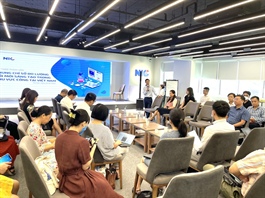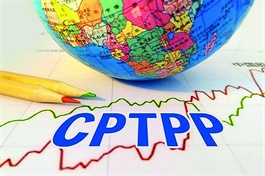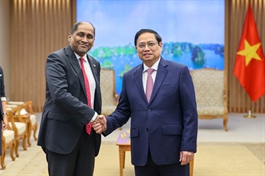South Korean investors lavish attention on Vietnam
South Korean investors lavish attention on Vietnam
More South Korean investors are interested in Vietnam’s business environment thanks to the abundance of an affordable and young workforce as well as rapid digital transformation.
The Korea and Vietnam Economic and Cultural Association (KOVECA) and the Association for Liaison with Overseas Vietnamese, along with ministries and localities, last week jointly held two Vietnam-Korea cooperation forums in both the northern and southern regions with the participation of 30 associations and 50 enterprises from South Korea.
The associations and enterprises are looking for investment opportunities in terms of urban and transport infrastructure, hospitals, renewable energy, high-tech, and career training.
Previously, in the framework of a conference connecting the northern province of Thai Binh and South Korea in early July by Thai Binh People’s Committee, coordinated with the Ministry of Foreign Affairs and the Korean Embassy to Vietnam, an investment registration certificate was granted to South Korea’s SMT Company for the JinYang Electronics Vina factory project in Lien Ha Thai Industrial Zone.
The provincial leader also signed an MoU on cooperation with the Korean Business Association in Vietnam to foster bilateral investment activities. Besides that, businesses of the two countries signed agreements on principle to boost bilateral cooperation.
These events are a part of the activities on the occasion of celebrating the 30th year of diplomatic ties between both nations.
Kwon Sung-Taek, deputy chairman of KOVECA, said Vietnam is among the top investment destinations for foreign groups moving away from China.
“South Korean enterprises have advantages in terms of capital, technical skills, technology, and experience, while domestic manufacturers have strengthened thanks to a young workforce and digital transformation,” Sung-Taek said. “Thus, they are also interested in doing technology transfer with domestic enterprises. However, in order to exploit thoroughly the investment capital inflows from South Korea, Vietnam needs to be more transparent in its policies.”
Fostering bilateral investment capital inflows is a leading priority of the two governments. In a phone conversation between Prime Minister Pham Minh Chinh and South Korean counterpart Han Duck-soo on July 4, the two parties emphasised the importance of promoting the investment activities in the schedule to raise the two-way trade to $100 billion next year and $150 billion by 2030.
They will also facilitate the import of Vietnamese agricultural produce, fruit, and seafood to South Korea and push for more South Korean funding in Vietnam in the fields of digital technology, electronics, renewable energy, and infrastructure development.
South Korea has remained in the top three largest foreign investors in Vietnam for many years. In the first seven months of 2022, investors from the country poured in $3.26 billion, accounting for 21 per cent of the total capital inflows to the country.
Although there is much potential for South Korea, many there are still concerned about the transparency of the legal framework and unclear investment attraction policy.
Choi Jeong Pil, CEO of JP Investment, commented that Vietnam needs to specify the national list of projects calling for foreign investment in the 2021-2025 period in order that foreign funds and investors can more easily evaluate the potential of each project.
“South Korean investors expect that the local authorities will clarify the detailed information about the incentive in administrative procedures, the general licensing, and land clearance. Everything needs transparency to avoid the impact on the investors’ implementation schedule, making them lose trust in the business environment in Vietnam,” he said.
In November 2021, Deputy Prime Minister Pham Binh Minh signed Decision No.1931/QD-TTg promulgating a list of 157 national-level projects calling for foreign investment for the period.
Pil also added that the government should create more favourable conditions for foreign investment funds to join in Vietnamese state-owned enterprises’ equitisation process. The foreign funds can be in charge of improving capacity and productivity, making opportunities for domestic businesses to join deeply in the global supply chain.






















